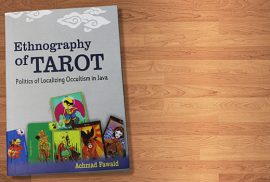Azis Anwar Fachrudin | CRCS | Book Review
How has Tarot, which was originally foreign to Indonesians, been practiced by Javanese people? Has there been any kind of adaptation of the practice to embrace Javanese local culture? Using etnography as a research method, the book by Achmad Fawaid entitled Ethnography of Tarot: Politics of Localizing Occultism in Java provides historical accounts and analitical study of the localization of the practice in Java.
The main question addressed by the book, originating from Fawaid’s master’s thesis at CRCS, UGM, is how Javanese belief system has made influences on Tarot and its Javanese practitioners. Many of the book’s data are based on interviews with Javanese Tarot practitioners themselves, examined by using the lenses of the theories developed on etnographic studies or anthropology. The book then argues that Javanese Tarot practitioners have “localized” the global “occult” practice and that this localization could be understood in terms of “adaptation”, “acculturation”, indigenization”, or “hybridization”—each of these concepts are elaborated in the book.
 The book suggests that in the process of localization the Western Tarot practice has been intertwined with Javanese esoteric occultism. The kebatinan ideas, quite popular among Javanese people, such as tapa, samadi, mutih, wayang performance, and Javenese traditional healing, have been absorbed and carried out in the process of localization—this is the fact that some Javanese Muslims later accuse the practice to be deviant constituting a form of shirk, klenik, perdukunan or a kind of shamanism.
The book suggests that in the process of localization the Western Tarot practice has been intertwined with Javanese esoteric occultism. The kebatinan ideas, quite popular among Javanese people, such as tapa, samadi, mutih, wayang performance, and Javenese traditional healing, have been absorbed and carried out in the process of localization—this is the fact that some Javanese Muslims later accuse the practice to be deviant constituting a form of shirk, klenik, perdukunan or a kind of shamanism.
The research findings the book poses is that (1) Javanese Tarot practitioners have negotiated themselves in the cultic milieu they are living in by “localizing their alias, communities, Tarot reading strategies, Tarot decks, and their personal preference to gather in candi”; and that (2) Tarot practice in Java has closely been connected to some Javanese belief systems, such as rasa and kahanan, and this makes the practitioners practice Javanism, either consciously or unconsciouly, while playing Tarot. Because of these two, Fawaid argues, the localization of Tarot in Java has lead to a “cultural ambivalence” as an implication that the practitioners cannot be free from it as they are practicing global occult practice while maintaining Javanese cultural identity.
In the end, as stated in the epilogue of the book, Fawaid argues that this process of localization as a way of examinig Tarot practices should be a contribution to “occult discourse”. He critizes the common assumption that Tarot reading is strictly divided into three characteristics: psychology, intuition, and spirituality. Fawaid poses one element missing, that is, localization in the forms of abovementioned concepts which should be added in the discourse and which shows a hybridity within Tarot practices between local beliefs and global practices.
Overall, the book lays a foundation for further research on the case; the etnographic accounts of Javanese Tarot have been quite deeply examined in the book. If there is one question to stimulate further research, it can be a more philosophical discussion, that is, why Tarot is considered an occult practice. The book elaborates anthropological concepts (acculturation, indigenization, hybridity, etc.) but for the most part, it seems, it takes the concept of occultism for granted. Occultism, like the concept of religion, which may contain a modern construction of meaning, should be more philosophically discussed and critically examined in the first place. In fact, this has become within the heart of the problem when Javanese Tarot practitioners try to negotiate their identity with religious milieu of Javanese people.
Ethnography of Tarot: Politics of Localizing Occultism in Java | Author: Achmad Fawaid | Publisher: Ganding Pustaka, Yogyakarta | Year Publishing: November 2015 | Pages: 208 pages
Arsip:


